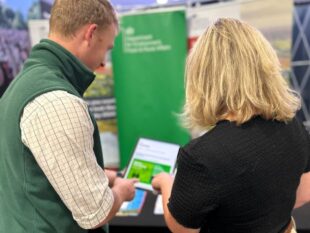https://defrafarming.blog.gov.uk/transcript-sustainable-farming-in-the-lake-district/
Transcript: Sustainable Farming in the Lake District
Video transcriptMy name's Danny Teasdale. I run a community interest company called Ullswater Catchment Management.I've lived here all my life and my family have farmed all around here for generations. I've got friends that are farmers. I've got family that are farmers. And I like my conservation as well. I really like my wildlife.When we came to it, this field was just one 5-acre block. That side was non-productive. So we split it in half, planted that side up, and then subdivided this one because it just works better for grazing.So we can graze the bottom field, graze this one and graze that one, and it just means you can shut them off one at a time and let them rest and grow up.There'll be some oaks. These will be oak standards. It's just what grows well, really. Even the wood, we can still run the cattle through there in autumn when the leaves are off. So we can put the cattle into the wood as well. It just means that we can rotate the pigs, the sheep and the cows.People know us, and they trust us, and they come to us for advice. They've got one point of contact. They can just give me a ring and just say, can you come and have a look around the farm? See what you think. See what we can do.It's then up to me to go to whoever, to the Woodland Trust, to the Environment Agency, and then we can make that happen.It's having that one role, that facilitator role between farmers, and then tying that in with what government wants to see happen.Everyone's different. There are no two farmers that are the same.Once they trust that you have their best interests at heart, it just scales up from there and then it's word of mouth.Any of the farmers that we've visited, I think it's quite a good example, they're all productive farms. They've all got environmental things that they'd like to do and that they could do more ofwithin a commercial farm business.There's a lot of people getting interested in re-meandering because if you do it right, you can actually help with the natural flood management, but you can improve the drainage on the farm as well.New hedgerows, whether they're just standard hedgerows or shelter belts.There's a lot of folk want to see ponds put back in. There's plenty of areas and wet spots thataren't going to get in the way of farming.The point of setting the CIC up (community interest company) was that I want to show that we can have farming, we can have wildlife, we can have natural flood management. By putting the right thing in the right place, we can have all these kinds of things that work with farming as well.



 The
The 